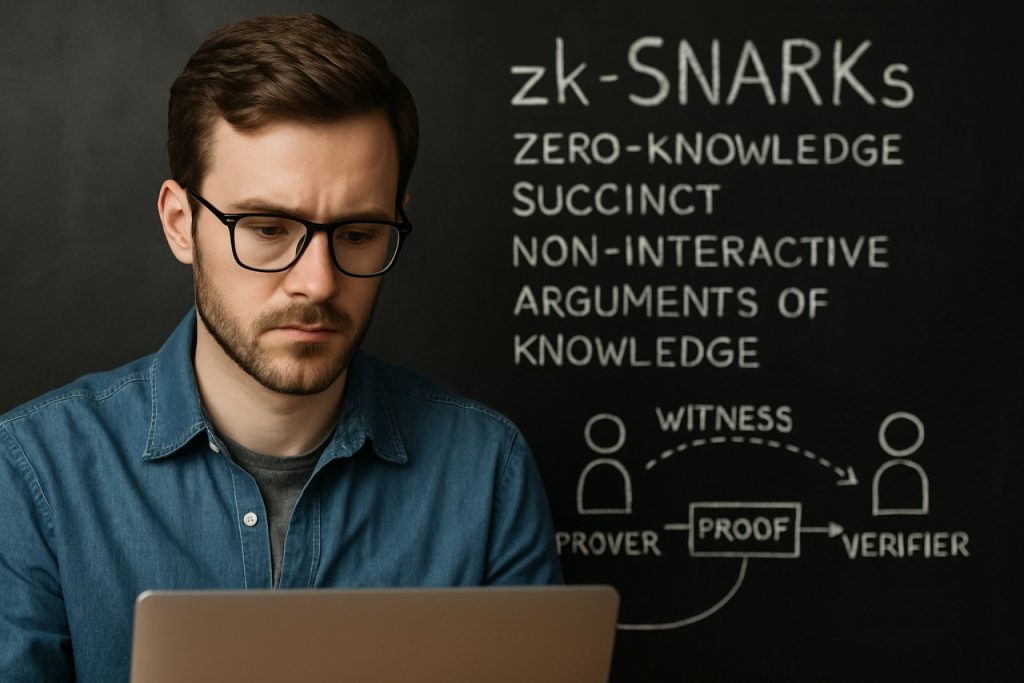
Demystifying Zero-Knowledge Succinct Non-Interactive Arguments of Knowledge (zk-SNARKs): How They Enable Secure, Private, and Efficient Proofs in Modern Cryptography
- Introduction to Zero-Knowledge Proofs
- What Are zk-SNARKs? Core Concepts and Terminology
- How zk-SNARKs Work: The Underlying Cryptographic Principles
- Key Properties: Succinctness, Non-Interactivity, and Zero-Knowledge
- Applications of zk-SNARKs in Blockchain and Beyond
- Security Considerations and Limitations
- Recent Advances and Future Directions in zk-SNARK Research
- Conclusion: The Impact of zk-SNARKs on Privacy and Verification
- Sources & References
Introduction to Zero-Knowledge Proofs
Zero-Knowledge Proofs (ZKPs) are cryptographic protocols that enable one party (the prover) to convince another party (the verifier) that a statement is true, without revealing any information beyond the validity of the statement itself. Among the most advanced and widely adopted forms of ZKPs are Zero-Knowledge Succinct Non-Interactive Arguments of Knowledge (zk-SNARKs). zk-SNARKs are characterized by their succinctness (very short proofs), non-interactivity (requiring only a single message from prover to verifier), and the ability to efficiently prove knowledge of a solution to a computational problem without revealing the solution itself.
The development of zk-SNARKs has had a profound impact on privacy and scalability in blockchain and distributed ledger technologies. By allowing transactions and computations to be verified without exposing underlying data, zk-SNARKs enable confidential transactions and efficient verification of complex computations. This is particularly valuable in public blockchains, where transparency is essential but privacy is often compromised. For example, zk-SNARKs are a foundational technology in privacy-focused cryptocurrencies such as Electric Coin Company‘s Zcash, where they enable shielded transactions that hide sender, receiver, and transaction amount.
Beyond privacy, zk-SNARKs also address scalability challenges by allowing blockchains to verify large computations with minimal on-chain data. This property is leveraged in layer-2 scaling solutions and rollups, where zk-SNARKs compress many transactions into a single succinct proof, significantly reducing the computational and storage burden on the main chain. As research and implementation continue to advance, zk-SNARKs are poised to play a central role in the evolution of secure, scalable, and privacy-preserving digital systems.
What Are zk-SNARKs? Core Concepts and Terminology
Zero-Knowledge Succinct Non-Interactive Arguments of Knowledge (zk-SNARKs) are advanced cryptographic protocols that enable one party (the prover) to demonstrate to another (the verifier) that a statement is true, without revealing any information beyond the validity of the statement itself. The core concepts underlying zk-SNARKs are essential for understanding their security and efficiency properties.
The “zero-knowledge” property ensures that no additional information about the underlying data is disclosed during the proof process. “Succinctness” refers to the fact that zk-SNARK proofs are extremely short and can be verified quickly, regardless of the complexity of the original computation. “Non-interactive” means that the protocol requires only a single message from the prover to the verifier, eliminating the need for back-and-forth communication. Finally, “argument of knowledge” guarantees that the prover actually possesses the knowledge required to make the claim, rather than simply guessing or cheating.
Key terminology includes:
- Prover: The entity generating the proof of knowledge.
- Verifier: The entity checking the validity of the proof.
- Common Reference String (CRS): A set of public parameters generated during a trusted setup phase, used by both prover and verifier.
- Witness: The secret data or solution that the prover uses to construct the proof.
- Statement: The claim being proven, typically represented as a computational problem or circuit.
These concepts form the foundation of zk-SNARKs, enabling privacy-preserving applications in blockchain, authentication, and beyond. For further reading, see Zcash and Electric Coin Company.
How zk-SNARKs Work: The Underlying Cryptographic Principles
Zero-Knowledge Succinct Non-Interactive Arguments of Knowledge (zk-SNARKs) are built upon a sophisticated interplay of cryptographic principles that enable one party (the prover) to convince another (the verifier) that a statement is true, without revealing any information beyond the validity of the statement itself. At the core of zk-SNARKs are several foundational concepts: zero-knowledge proofs, succinctness, non-interactivity, and arguments of knowledge.
The zero-knowledge property ensures that the verifier learns nothing about the underlying witness (the secret data) except that the statement is true. This is achieved through carefully constructed mathematical protocols that simulate the proof without access to the witness, a concept formalized by Goldwasser, Micali, and Rackoff. Succinctness refers to the ability of zk-SNARKs to produce proofs that are extremely short and quick to verify, regardless of the complexity of the original computation. This is made possible by encoding computations as arithmetic circuits and leveraging polynomial commitments.
Non-interactivity is achieved through the Fiat-Shamir heuristic, which replaces interactive challenge-response rounds with a deterministic process using cryptographic hash functions, as described by Fiat and Shamir. Arguments of knowledge ensure that a valid proof can only be generated if the prover actually possesses the witness, enforced by cryptographic assumptions such as the knowledge of exponent assumption.
Modern zk-SNARK constructions, such as those used in Zcash, rely on advanced techniques like quadratic arithmetic programs (QAPs) and elliptic curve pairings to achieve these properties efficiently. The combination of these principles allows zk-SNARKs to provide scalable, privacy-preserving proofs suitable for blockchain and other decentralized applications.
Key Properties: Succinctness, Non-Interactivity, and Zero-Knowledge
Zero-Knowledge Succinct Non-Interactive Arguments of Knowledge (zk-SNARKs) are distinguished by three foundational properties: succinctness, non-interactivity, and zero-knowledge. Succinctness refers to the ability of zk-SNARKs to produce proofs that are extremely short—often just a few hundred bytes—regardless of the complexity or size of the underlying computation. This property enables rapid verification, making zk-SNARKs highly scalable for applications such as blockchain systems, where efficiency is paramount International Association for Cryptologic Research.
Non-interactivity means that zk-SNARKs require only a single message from the prover to the verifier, eliminating the need for back-and-forth communication. This is achieved through the Fiat-Shamir heuristic, which transforms interactive proofs into non-interactive ones in the random oracle model. Non-interactivity is crucial for decentralized environments, as it allows proofs to be generated and verified asynchronously and without coordination Zcash.
Zero-knowledge ensures that the proof reveals no information about the underlying witness (the secret data) beyond the validity of the statement being proven. This property is essential for privacy-preserving applications, as it allows one party to convince another of knowledge or correctness without exposing sensitive information. The combination of these three properties makes zk-SNARKs a powerful cryptographic tool for secure, private, and efficient verification in a wide range of digital systems Electric Coin Co..
Applications of zk-SNARKs in Blockchain and Beyond
Zero-Knowledge Succinct Non-Interactive Arguments of Knowledge (zk-SNARKs) have emerged as a transformative cryptographic tool, particularly within blockchain ecosystems. Their primary application is in enhancing privacy and scalability by enabling one party to prove possession of certain information without revealing the information itself or requiring interactive communication. In blockchain, zk-SNARKs are most notably used in privacy-focused cryptocurrencies such as Zcash, where they allow for shielded transactions that conceal sender, receiver, and transaction amount while maintaining network integrity.
Beyond privacy, zk-SNARKs facilitate scalability solutions. For example, in layer-2 protocols and rollups, zk-SNARKs are used to aggregate and verify large batches of transactions off-chain, then submit succinct proofs to the main chain. This approach, adopted by projects like Polygon zkEVM and Scroll, significantly reduces on-chain data and computational requirements, enabling higher throughput and lower fees.
Outside of blockchain, zk-SNARKs are being explored for secure authentication, confidential voting systems, and regulatory compliance. In digital identity, zk-SNARKs can prove attributes (such as age or citizenship) without disclosing personal data, supporting privacy-preserving identity verification as seen in initiatives like iden3. In supply chain management, zk-SNARKs can verify product provenance or compliance with standards without exposing sensitive business information.
As research and implementation mature, zk-SNARKs are poised to underpin a wide range of privacy-preserving and efficient applications, both within and beyond blockchain technology.
Security Considerations and Limitations
While Zero-Knowledge Succinct Non-Interactive Arguments of Knowledge (zk-SNARKs) offer powerful privacy and scalability benefits, their security relies on several critical assumptions and design choices. One primary consideration is the trusted setup phase required by many zk-SNARK constructions. If the randomness generated during this setup is compromised, an adversary could potentially forge proofs for false statements, undermining the system’s integrity. Efforts such as multi-party computation ceremonies aim to mitigate this risk, but the setup phase remains a point of concern Electric Coin Company.
Another limitation is the reliance on specific cryptographic hardness assumptions, such as the security of elliptic curve pairings and the knowledge of exponent assumptions. Advances in quantum computing or breakthroughs in cryptanalysis could threaten these foundations, potentially rendering zk-SNARKs insecure International Association for Cryptologic Research.
Additionally, zk-SNARKs are susceptible to implementation bugs and side-channel attacks. Incorrect parameter handling, flawed randomness generation, or vulnerabilities in the underlying cryptographic libraries can all lead to security breaches. The complexity of zk-SNARK circuits also increases the risk of subtle errors that may not be immediately apparent Zcash.
Finally, while zk-SNARKs provide succinct proofs, the process of generating these proofs can be computationally intensive, potentially limiting their practical deployment in resource-constrained environments. Ongoing research seeks to address these limitations through alternative constructions, such as transparent SNARKs and post-quantum secure schemes.
Recent Advances and Future Directions in zk-SNARK Research
Recent years have witnessed significant progress in the field of Zero-Knowledge Succinct Non-Interactive Arguments of Knowledge (zk-SNARKs), driven by both theoretical breakthroughs and practical demands from blockchain and privacy-preserving applications. One major advance is the development of universal and updatable trusted setups, such as those implemented in the Zcash Sapling upgrade, which allow multiple circuits to share a single setup, reducing the overhead and trust assumptions previously required for each new application.
Another key direction is the reduction of proof sizes and verification times. Protocols like PLONK and Aztec have introduced more efficient proving systems, enabling faster and more scalable zero-knowledge proofs suitable for real-world deployment. These improvements are crucial for integrating zk-SNARKs into high-throughput environments such as layer-2 blockchain solutions and privacy-preserving smart contracts.
Research is also focusing on post-quantum security, as current zk-SNARK constructions often rely on cryptographic assumptions vulnerable to quantum attacks. Efforts to base zk-SNARKs on lattice-based or hash-based primitives are ongoing, as highlighted by initiatives from NIST and academic collaborations.
Looking forward, the field is exploring transparent zk-SNARKs, which eliminate the need for trusted setup altogether, as seen in protocols like Halo. Additionally, recursive proof composition and interoperability with other zero-knowledge proof systems (e.g., zk-STARKs) are active areas of research, promising even greater scalability and flexibility for privacy-preserving technologies.
Conclusion: The Impact of zk-SNARKs on Privacy and Verification
The advent of Zero-Knowledge Succinct Non-Interactive Arguments of Knowledge (zk-SNARKs) has significantly transformed the landscape of privacy and verification in digital systems. By enabling one party to prove possession of certain information without revealing the information itself, zk-SNARKs have become a cornerstone technology for privacy-preserving applications, particularly in blockchain and decentralized finance. Their succinctness and non-interactivity allow for efficient verification, making them highly scalable and practical for real-world deployment.
In the realm of privacy, zk-SNARKs empower users to maintain confidentiality over sensitive data while still participating in public systems. For example, cryptocurrencies such as Zcash utilize zk-SNARKs to enable shielded transactions, ensuring that transaction details remain private while still being verifiable by the network Electric Coin Company. This balance between transparency and privacy is crucial for fostering trust and adoption in decentralized ecosystems.
From a verification standpoint, zk-SNARKs streamline the process of proving computational integrity. They allow for the validation of complex computations with minimal data and computational overhead, which is essential for scaling blockchain networks and reducing transaction costs Ethereum Foundation. Furthermore, their non-interactive nature eliminates the need for back-and-forth communication, enhancing usability and security.
Looking forward, the impact of zk-SNARKs is poised to grow as more industries recognize the value of privacy-preserving verification. Their integration into identity management, supply chain transparency, and secure voting systems highlights their versatility and transformative potential. As research and development continue, zk-SNARKs are expected to play a pivotal role in shaping the future of secure, private, and efficient digital interactions.
Sources & References
- Electric Coin Company
- Electric Coin Company
- Goldwasser, Micali, and Rackoff
- Fiat and Shamir
- Polygon zkEVM
- Scroll
- iden3
- Aztec
- NIST
- Ethereum Foundation



